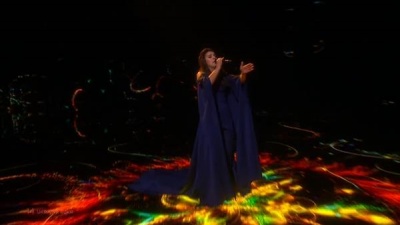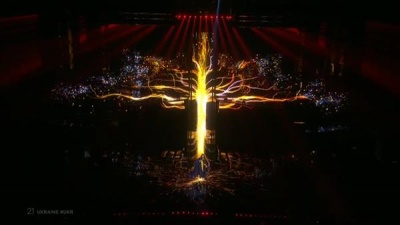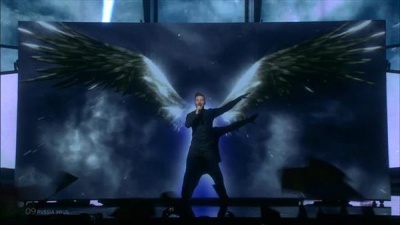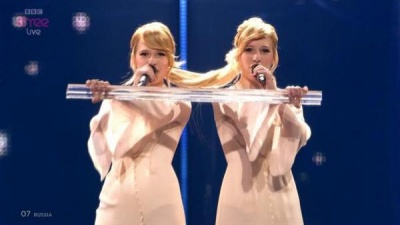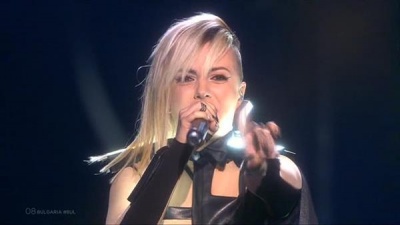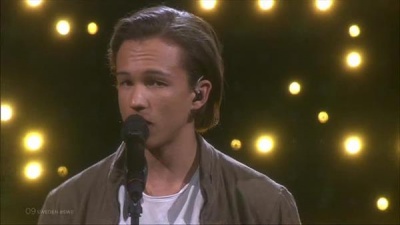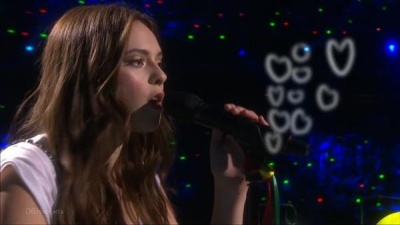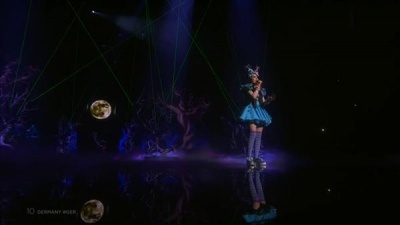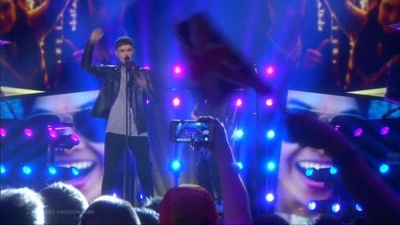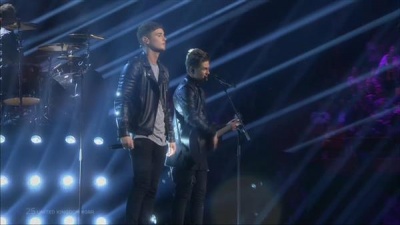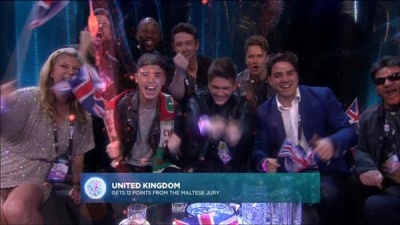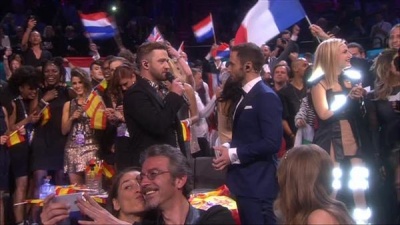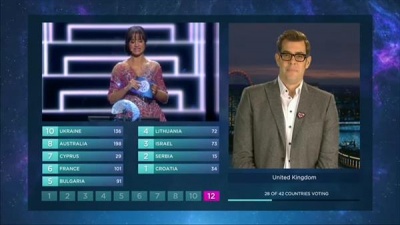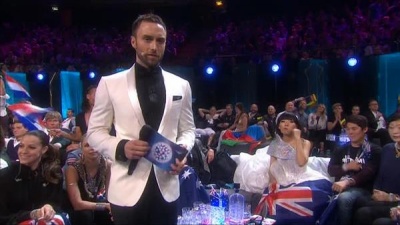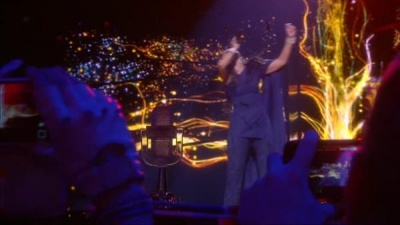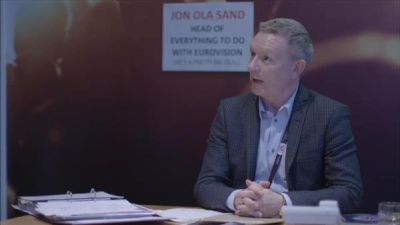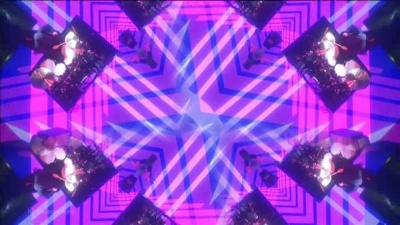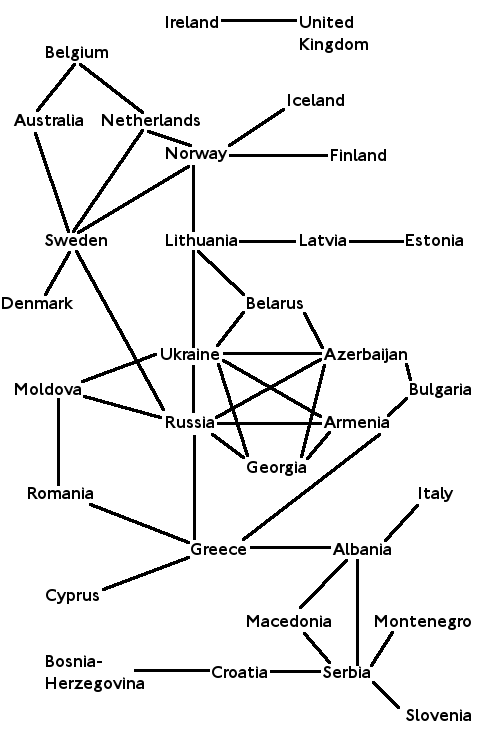Weaver's Week 2016-05-22
Last week | Weaver's Week Index | Next week
What completes this sequence? 4) Albania — Montenegro 3) Macedonia — Serbia 2) Moldova — Romania The answer comes later.
Contents |
Eurovision Song Contest 60th Anniversary Edition
SVT for EBU, seen on BBC1, 14 May
In retrospect, we can see that three songs qualified from the jury semi-finals. Even if they hadn't picked up a single public vote, they'd have gone through. "Sound of silence", "1944", and "What's the pressure" all did the necessary on Wednesday.
"Made of stars" on Wednesday, "Walk on water" and "You are the only one" on Monday all passed the winning post in the jury rehearsal. But had they scored nothing on televote, they could be overtaken.
What was "1944" about, then?
The surface explanation: "1944" is about Jamala's grandmother. Along with millions of other Crimean Tatars, she was sent to Uzbekistan for "collaborating with the nazis".
Crimea had been invaded in 1941, and – according to Stalin – the local population hadn't put up enough resistance to the nazis. This was a fib, many had fought against the occupying force. Stalin wished to use Crimea as a base from which to attack Turkey, and Stalin feared that the Tatars would side with the Turks.
About half the Tatar population died during the deportation. The USSR government prevented them from passing on their cultural heritage, or from returning to Crimea until the USSR itself collapsed in 1991.
Late last year, Ukraine formally recognised the deportation as a genocide. Russia does not agree with the description, and misses no opportunity to say it's a wrong description. More from the Oxford University Press.
The metaphor: "1944" is about humanity's failure, about prejudice and nastiness. It's about how some people in power try to marginalise others. It's about how the powerful can exploit religion, nationalism, race, other differences. How they create out-groups, split the world into Us and Them.
The extended metaphor: Crimea, plus a song against prejudice, plus Ukraine. Some televoters may have "sent a message" to the Russian government. A message involving a hand gesture and few fingers.
And it sells a story that Europe wants to hear. It's not just a song contest, not any more. This is each country – through its broadcaster – sending a message to the rest of the continent, to the rest of the world. It's what the knowledge wonks call "soft power", a mesh of influence and idealism and cultural capital. Terry Wogan never got the hang of this.
But they get it in Sarajevo. They know soft power in Israel. And, by gum, they want cultural capital in Kyiv and Moscow and the area. Rather than park tanks on each others' lawns, they send pointed songs. "We don't wanna put in" (GPB, 2009) was deemed too spiky. "Face the shadow" (AMPTV, 2015) passed muster, but felt like a lecture. "1944" sheathed its blade, but still cuts a grievous wound.
"1944" can only win if it's technically excellent. Jamala has a tremendous vocal range, the staging tells her story, the song uses every beat to maximum effect.
Unlike "The sound of silence", it was something that appealed to the viewer at home. Technically, the SBS entry was excellent. A modern, contemporary song, with astounding vocal ability. Dami Im's performance was the best of the Friday night, showing her many and varied strengths.
But the show didn't connect with the audience. Dami Im was a cold performer. At one point, Dami seems to use the camera as a touchscreen. It symbolises of the divide between we viewers and Dami the performer: there's always something between us. When she reaches out to us, she stops, because she's controlling something.
A bear with a sore head
And so to RTR's entry, "You are the only one". Last year, Måns won with jury ability and from connecting with the audience. This year, Sergey sent something to please the audience – a remarkable projection display board, complete with blocks that appeared to move in and out of the wall.
Televoters loved it, it's a simple show, easy to follow – he's literally climbing the wall while we watch. But again, it's a self-contained universe. We see a bloke climb the steppes in the Siberia Zone, and if he falls off, it's an automatic lock-in down the salt mines. Sergey doesn't engage much with the camera: we viewers are spectators, we're not drawn into his world, we're barely acknowledged.
Juries were less charmed. Sergey presents a simple and unchallenging song. His acrobatics make it a little more difficult to sing, but he stays within a comfortable register throughout. We've seen the retractable wall before – the backing dancers of BRTC Belarus cliimbed them in 2007. Most of the juries ranked the entry in the dreaded 7th-to-15th range: a smattering of points, but nothing that's going to set the scoreboard alight.
The Russians have won something – the European Sore Losers Award. A parliamentarian blethered, "victory clearly did not go to the best song." We agree with him, but (for reasons we'll get to later), "Not my soul" wasn't performed.
The parliamentarian continues, "the contest lost because political attitudes prevailed over fair competition." This theme is developed by Russia's paid shills. They cast aspersions on the professional juries, forgetting two things. 1) these rules were in place when RTR entered the competition and b) Russia is so committed to openness and transparency that one juror tried to livestream the deliberations.
Russia's shills continue, "Genuine Eurovision fans, who believe the contest should simply be about voting for the best song regardless of what one thinks of that country politically, are appalled at what happened." A genuine Eurovision fan writes: Um, no, not appalled at the winner. Not at all.
And so it witters on. Russia's media wants to pretend that it was, somehow, "robbed" of "victory". Rubbish. Their broadcaster simply didn't have a good enough entry to win. They had a very good entry, but there were at least two better.
In the battle for soft power, Russia lost. Russia lost in 2014, when it started to be horrible to the gays. Russia lost in 2015, when the crowd jeered a cynical anthem. Russia lost in 2016, when it simply wasn't that good, and Europe wanted to hear another story.
Most of this bluster is for internal consumption. Russia stomps its little feet and pretends other nations still respect it. The national government wants to sell the myth to its own people, that the world would be so much better if only there wasn't a massive international conspiracy against their plucky and insignificant little world superpower.
More: Catheine Baker explores how a song about mass violence won the contest.
Also did well
Poli Genova is the current Eurovision favourite. She hosted the Junior Eurovision Song Contest last November, fizzing with energy and fun. The interval acts included some light-up clothes and the show began with the inspired piece "Where's my dress?"
These ideas combined for a remarkable costume. But it would be naught without a storming song. For our money, "If love was a crime" was a standout from the contest. Modern and accessible, the song could fit onto contemporary streaming lists in a heartbeat. Poli delivered a quality performance every time, showing her vocal abilities and selling the song.
And, yes, the gimmick was important. "The cool song with the girl in the light-up dress" identifies the song at once. Even at 11pm, even after some refreshments, televoters can say, "Liked that, voted for it."
Frans finished fifth. "If I were sorry" was the ultimate in non-apology apologies. The subjunctive is used to maximum effect. "*If* I were sorry, I'd do this and that," sings Frans. The unspoken subtext: he's not sorry, so he's not going to do this. Or that.
The linguistics will have gone over the head of most viewers. They're left with a pleasant song, performed by a cute singer. Nothing outstandingly brilliant, nothing as good as the top four.
France 2 came sixth. "J'ai cherché" was performed by Amir, and he brought immense stage presence. One man on the massive stage was a tough ask, the sound and light display proved popular with the viewing public.
Rest of the top ten were "LoveWave", the leggy disco number from AMPTV. "Color of your life" lost it with some bad singing on Friday, and gained from the Polish diaspora. "I've been waiting for this night" won the UK televote. We didn't get "What's the pressure" until the final recap: it's a joyous and catchy song, and televoters love Fleur East.
Other automatic qualifiers
"No degree of separation" (RAI, 16th) felt like a dream sequence by Phoebe from Friends after she'd eaten a truckload of cheese. The presentation was memorable – flowers and camera tricks, though the rubber duck didn't make it out of rehearsals. The song was a sorbet, heard and forgotten.
"Say yay!" (TVE, 22nd) was filler, coming on after Sergey. That's a shame: a more sympathetic draw would have given this carefree number a place to breathe. Might have benefitted from a more intimate staging.
"Ghost" (NDR, 26th) marks the second consecutive 26th place for Germany. The problem was a decent song – but it didn't work with the staging they chose. "Ghost" could have worked in a dreamscape, with Jamie-Lee being chased by a giant rabbit like she was in the Wild Things endgame. It could have worked in RAI's flower garden, so long as there was a conclusion to the story (Jamie-Lee walking off into a white light?)
But they had her walking through a graveyard; she controlled the visuals but showed fear in the song. Nothing would have lifted this above 20th, but Germany could do better. The broadcaster was confidently predicting a top ten performance.
"You're not alone" (BBC, 24th). Um, can we rewind to 28 February?
- The winning song? "You're not alone". Oh crumbs. Middle of the road, bland, decrepit, dull drivel. And in the reprise, dangerously close to a Steps number, the last thing on my mind or some such. Twentieth if the BBC is very lucky.
Credit where it's due, they avoided further Steps comparisons. But this was another sorbet song, it happened, nothing much on screen, and no reason for the viewer to pick up her phone and text. The cute boys didn't tell a story: they're not dating, they look awkward when they give each other a hug. They don't have the chemistry of Jedward.
The song wasn't as good as the last couple of years. "Children of the universe" and "Still in love with you" were both statement songs. With a really good show, both could have been massive. But they were killed by the staging: Molly in 2014 looked weird; Electro Velvet last year were dominated by their light-up dresses.
This year, a simple stage show didn't distract from the song. Not when compared to NDR's effort. But it didn't have a great song playing: it just sat there, happened, and finished.
There were grounds for optimism. A performance that doesn't detract from the song is progress, albeit progress from a very low base. The juries showed that they appreciate technical merit: ten sent some points, which is half as good as the Russian entry. And the magic words "United Kingdom: Twelve Points" were heard for the first time in five years.
We appreciate that the BBC has constraints. They can't invite an A-list star like Adele, because it's ten days out of her touring schedule, and she could play to the entire population of many nations in that time. But they don't have to work with complete unknowns either. They can work with known acts whose careers are on the up. To pick a name at random, Wstrn – a four-piece boy band who are being heavily marketed in the UK and Europe. Grab next year's Wstrn, help them find a great track, get Radio 1 on board, and see what happens.
And we appreciate that the BBC is slowly changing attitudes, it's beginning to accept that this is the Eurovision Soft Power Competition (Via The Medium of Song). 2014 was lost when the producers put the BBC stone last. 2015 was lost with the staging. 2016 was lost with the weak choice of song by the public. The building blocks are there, the Beeb needs to get them all down in the same year.
We were struck by a hypothetical. What if Blue had bothered with the jury final in 2011? "I can" was a quality pop song, performed by seasoned professionals who could still cut through to the televoters. They treated the jury final as a rehearsal, only gave a decent effort when everyone else excelled, and were marked down. The BBC finished 11th, when they could have had a top five finish. That would have been two top fives in three years, mainstream acts would be more confident that they didn't have to kill their career.
Interval!
Again, Graham Norton hit a good note in commentary. He gets the Eurovision Soft Power idea, though he has to pretend that he doesn't. And he treats the contest seriously. Norton laughs with the show, too often the Mills-Giedroyc programme laughed at the contest. We appreciated the First Annual Terry Wogan Memorial Drinks Interval: after song 8 is as good a place as any.
Flags remain a problem. The organisers were derided when they published a list of "allowed" and "banned" flags, which they later had to withdraw. AMPTV's delegation were put on a final warning after showing the flag of Nagorno-Karabakh. Spectators were barred from displaying the Basque flag. Many television shots were damaged or ruined by ill-placed banners. This column would like to see flags removed from the arena entirely.
The interval acts? Lots of them. Justin Timberlake in the green room, showing his attention to fine detail. Look at his monogrammed earpieces: JT. Take note, broadcasters who have to swap "Jake" and "Joe" placecards. Timberlake performed his classic hit "Rock your body" (2003) and his new hit "Can't stop the feeling!". It's given him a number one hit across Europe.
The hosts snarked at the last few contests in "Love love peace peace"; like the opening on Thursday, the wit and warmth reminded us of Animaniacs at their best. "Nerd Nation" had a high concept, that Sweden lived for Eurovision Song Contest things. Between these presentations, it felt like SVT was cutting ties with the past.
One tie they didn't cut was to Junior Eurovision, where Destiny stayed up to talk with Måns. She didn't get to perform, it wouldn't be the done thing to upstage Mr. Timberlake.
For broadcasters not taking the adverts, the entire history of Swedish music was condensed into four minutes, and Lynda Woodruff did her comedy turn. That joke is wearing very thin. The active voting window – all 43 minutes – didn't feel like a long time. After the voting ended, and while other broadcasters took their adverts, the BBC showed Måns's new single.
SVT had kept strictly to schedule, and only slipped by a minute during the jury voting. It was fast, a breakneck tour of Europe. The producers decided not to show graphics before each jury result: that alone trims five minutes off the show.
They didn't repeat the votes in French. The spokesperson from France 2 gave results bilingually, and no-one else bothered. And many of the link-ups were over internet connections, no need to book expensive satellite systems – or suffer satellite delays – when they can just use trusty IP. Good example of Eurovision's little technical advances.
The producers had scheduled seven minutes to reveal the televotes. This was an under-estimate. They sped through the bottom 16, and then seemed to get an attack of the gremlins. Captions were misplaced, screens weren't ready. Petra and Måns ploughed through, as we found that SBS wasn't going to top the televote, and left points in the pot.
Then that TVP wasn't quite going to go from worst to first. A nimble presenter would have spotted there were just under 700 points left to give. NTU would have to equal TVP's 222, so must overtake SBS. RTR also guaranteed 222. But how do the remaining 250 or so divide?
The producers had used a "points remaining" graphic in rehearsal, but it was missing in the final. The national Graham Nortons would need to be maths geniuses: 323 for NTU leaves RTR short. Tension could be maintained all the way to the final reveal: how many points did RTR actually have? As we know, not enough.
For all this, we found the voting to be synthetic. They spent a long time finding the jury winner, and didn't even present Dani Im with a little trophy. Then the televote reveal was done to conceal neighbourly / diaspora / friendly / political voting, and to create false tension.
The three medalists won the Marcel Besançon Awards. "You are the only one" won the Press Award, "1944" won the Artistic Award, and "Sound of silence" won the Composer Award.
The sales charts show that Justin Timberlake won the contest. "If I were sorry" and "Sound of silence" were about equal in sales, with "1944" and "You are the only one" following a respectful distance behind. The BBC's entry made a creditable showing, we have it inside the top 20 – people across Europe were motivated to download the song.
If the Eurovision Song Contest used the 2014-15 voting rules:
We first need to remove the imputed (made-up, faked, falsified) "televotes". We know that San Marino will never return a televote.
From a quick analysis, it looks like SMRTV has had its fake "televote" made up from results in Estonia, Latvia, and Lithuania. There may be elements of Georgia and Ireland, and we're getting a weak signal from Poland – but that could be because Poland submitted the Euro-standard televote.
The EBU hasn't been transparent about its fabrication. We find this very regrettable.
Nor has the EBU given other cases where a televote or jury vote has been made up. Our research lends suspicions about the televote in some other nations, but they could just reflect the Euro-standard result.
So, with these caveats, what changes with the voting structure? Only the winner!
- SBS win! "Sound of silence" has 313 points, "1944" has 279, "You are the only one" 237.
- "If love was a crime" (BNT), "J'ai cherché" (F2), "If I were sorry" (SVT) finish in next spots.
- "LoveWave" (AMPTV) and "I've been waiting for this night" (LRT) only other entries to reach 100 points.
- Joe & Jake: 30 points, 21st place. 10 from Ireland, 8 from San Marino, 6 each from Malta and Austria. They beat "Made of stars" (IBA).
- "I stand" (CT) bottom with 1 point, from Croatia.
- New voting format didn't change who qualified from the semi-finals.
The United Kingdom result is a perfect example of how the new system changes things. GPB's entry, "Midnight gold", was the choice of the UK jury. Really, it was. The jury gave it 12 points. The Great British Public had more sense, and ranked it 19th in the televote. GPB's total mark from the UK was thus 12 points.
Under the old system, GPB would have a total rank of 20. It would have fallen behind other performances with a better total rank – "1944" came 2nd and 6th, "The sound of silence" 3rd and 5th, "I've been waiting for tonight" 7th and 1st. In fact, "Midnight gold" would have finished behind eight other songs, so would have scored 2 points.
The new voting system has benefitted GPB by 10 points. LRT would have had 12, now gets 12+4 = 16. SBS would have had 10, now gets 8+6 = 14. NTU would have had 8, now gets 10+5 = 15. "Color of your life" (TVP) would have had 3 under the old system, having been 18th in the jury and 2nd in the televote. That's now worth 10 points.
Local voting
Serbia and Montenegro are the pair of countries who most reliably swap votes. Every time it can, Serbia donates 12 to Montenegro; in return, Montenegro sends an average of 11.
Moldova and Romania, Serbia and Macedonia, Albania and Montenegro are the next pairs. Cyprus and Greece are only the fifth biggest vote-swap, exchanging an average of 10.25 points per year.
Our map shows countries that engage in significant mutual vote swaps. "Significant" means they're unlikely to arise by chance assuming all voting is random. "Mutual" means that Greece votes for Cyprus and Cyprus votes for Greece. Each year's votes are an average of semi-final and final scores; this year, we've averaged jury and televotes into a single mark of 0-12.
What's changed?
- Two poor results in a row mean Iceland and Denmark are no longer voting for each other.
- Ireland has fallen out with Latvia, and now sits on the fringes with only the UK for company.
- Australia nestles comfortably between Belgium and Sweden. The Netherlands is friendly with both.
- Sweden has gained a friend in Russia, linking the Scandinavia bloc with the ex-Soviet bloc.
- Lithuania has re-established links with Latvia – that relationship only happens when both send decent songs.
- Lithuania also looks to Ukraine and Belarus.
- Six former Soviet states mostly vote for each other.
- Poland switched allegiance from Italy to Ukraine.
- Greece – Albania straddles the ex-Soviet and ex-Yugoslavia blocs.
- Former Yugoslavia has weaker links – from poor results in 2013 and mass withdrawals in 2014.
UK has strong votes for Australia, Lithuania, Malta, Russia, and Sweden; only Ireland sends points, and will need to give some next year for this relationship to continue.
We've also looked at countries with highly correlated votes. These show countries that tend to give similar votes to the same entries. We see three new loose groups form:
- Central Europe, of Austria, Switzerland, Hungary, Slovenia, Croatia.
- South Baltic, of Germany, Poland, Lithuania, Latvia
- Mediterranean Basin, of Portugal, Spain, Israel, Cyprus.
And that's our Eurovision Song Contest coverage for the spring. We expect to name the winner of Young Musician next month, and cover the Junior Eurovision Song Contest in November.
This Week and Next
The battle lines are drawn for summer. ITV2's Love Island 2.0 series 2 begins on 30 May. Channel 5 has Big Brother 2.5 series 6, it begins in the first full week of June. So does Euro 96 series 6, this time with added Iceland. We will cover these series according to their editorial merits.
BARB ratings in the week to 8 May.
- Britain's Got Talent picked up 8.6m on ITV-SD, 2.18m on ITV-HD.
- Masterchef had its final, with 5.9m viewers. HIGNFY took a post-election special, seen by 5.1m.
- Bake Off Creme de la Creme continued with 3.5m viewers. Channel 4 didn't put any game shows into its top 30 for the second week in a row.
- Celebrity Juice returned to the top of ITV2's pile, with 1.215m viewers. Britain's Got More Talent fell away to 1.095m.
- Copycats on CBBC had 180,000 viewers. Australia's Next Top Model on Lifetime had 145,000. Clearly, all the supermodels in the world are less attractive than Sam and Mark.
While BBC1 spends the week at the Chelsea Flower Show, Britain's Got Talent has its semi-finals (ITV and TV3, Sun-Thu). The final's on Saturday. Channel 5 gets in with a profile of Ant and Dec (Fri). There's a new run of antiques quiz For What It's Worth (BBC1, weekdays). Paul Sinha from The Chase has a comedy series on Radio 4 (Thu).
Photo credits: SVT/EBU. Eurovision Voting Patterns graphic is copyright Iain Weaver 2016.
To have Weaver's Week emailed to you on publication day, receive our exclusive TV roundup of the game shows in the week ahead, and chat to other ukgameshows.com readers, sign up to our Yahoo! Group.


